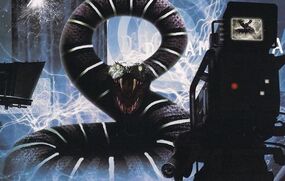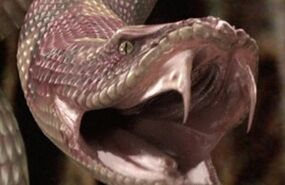Mara
The Mara was/were a gestalt being/species that dwelt in the Dark Places of the Inside and sought physical existence by taking over a host in their dream. Because of its unclear nature, the Mara was simultaneously thought of as a "he," "it," and "they."
Biography
Early history
The Mara was an entity created from the evil in the minds of the people of the planet Manussa in the Scrampus system. It was given independent life via the Great Crystal, which the Manussans created in a zero gravity environment. The Mara then founded the Sumaran Empire. (TV: Snakedance) It existed in the minds of its victims and could transfer itself in the form of a tattoo-like mark, to those who yielded to it. It was so evil that it could not bear the sight of its own reflection. (TV: Kinda)
On Manussa, the Mara was defeated and driven out by the Federator and cast into the "Dark Places of the Inside". (TV: Snakedance)
Escaping the Dark Places of the Inside
It was on the planet Deva Loka that the Fifth Doctor, Tegan and Adric first encountered the Mara. Tegan fell asleep listening to wind chimes and mentally entered the Dark Places of the Inside. The Mara manifested to her as an elderly game-playing couple Anatta and Anicca, who insisted she could not possibly exist, and then as Dukkha, who tempted and tormented her until she agreed to let the Mara take over her body. The Mara used her body to find and possess Aris, one of the peaceful Kinda tribe, leaving Tegan. Kinda tradition did not allow men (other than "idiots") to speak. Aris called himself "Aris, He Who Has Voice", and began to rally them against human colonists led by Hindle. The Doctor was able to prevent the humans detonating a bomb and managed to trap the Mara in a circle of mirrors and face itself, therefore driving it back into the Dark Places of the Inside. (TV: Kinda) Tegan remained very shaken by the experience, as she confided to Nyssa afterward. (TV: The Visitation)
Revenge on the Manussans
Unknown to all, the Mara still had influence over Tegan. It guided Tegan to take the Doctor's TARDIS to Manussa, the birthplace of the Mara, where a ceremony was to be held to mark the 500th anniversary of its banishment. The Mara used Tegan, the showman Dugdale, and the son of the Federator, Lon, to obtain the Great Crystal to restore itself to physical form. The Fifth Doctor was guided by an old mystic named Dojjen who showed him how to find the "still point". When the Mara tried to make its return at the ceremony, the Doctor concentrated his thoughts with a small replica of the Great Crystal, and by finding the still point was able to repel the Mara. Then by grabbing the Great Crystal, the Doctor broke the Mara's hold over its controlled Manussans, and destroyed its new snake body. This time, the Doctor believed the Mara had been destroyed for good. (TV: Snakedance) The Doctor told Tegan that the Mara would always be present, though she wasn't certain if he was speaking metaphysically about the nature of evil. She viewed it as some terminal disease from which she could relapse at any moment. (PROSE: Goth Opera)
Final possession of Tegan
However, the Mara had actually retreated into Tegan's mind a second time. Some time later, after the Doctor, Tegan, and Turlough had been reunited with Nyssa, (AUDIO: Cobwebs) it emerged to possess Tegan yet again. (AUDIO: The Whispering Forest) When the Doctor attempted to drive it out, it changed its tactics and entered into the Doctor's mind, leaving Tegan completely. It then consulted a book in the TARDIS library to find out about its history. Piloting the TARDIS to Manussa (under the pretence of having Tegan examined by a Manussan doctor), it landed the ship about one hundred years prior to the rise of the Sumaran Empire, and embarked on a scheme to bring about the subjugation of Manussa in that time period instead. In the process, keeping the Doctor as its primary host, it possessed several Manussans. It used an experimental Manussan technology (using Manussan blue crystals) to project the thoughts of its hosts into solid matter, manifesting itself physically as a giant snake.
However, Tegan and Turlough were able to free the Doctor using a circle of television cameras and screens (similar to the circle of mirrors used on Deva Loka). The Doctor linked the crystal the Mara was using as a link to the material world to the TARDIS so he could reverse the creature's physical manifestation. However, the process required that the crystal be in physical contact with the Mara, and the giant snake, fueled by the despair of the many Manussans it had managed to possess, had swallowed the TARDIS whole. In the end, a young man who had been brought into existence by the crystal technology sacrificed himself by going out into the snake's belly with the crystal, destroying it by "restoring the balance", as one of the snakedancers put it. Before its destruction, the Mara had managed to possess not only numerous Manussans, but Nyssa and Turlough as well. The Doctor stated that the Mara could not be said to have been fully destroyed, as it was inside all human beings. (AUDIO: The Cradle of the Snake)
Trenzalore
The Eleventh Doctor later encountered the Mara on Trenzalore, roughly 750 years after he started protecting the planet, and the town of Christmas. The Mara possessed various townspeople, and used them to dig up the skeletal remains of Jalen Fellwood. It then used the dreams of the controlled people to give form to the skeleton, creating a new physical body. Because of the human skeleton, the result was a human-snake hybrid.
The Mara then possessed all of the children in the town's school, threatening first to use them to attack the adults, and then themselves, unless the Doctor did as it demanded. Unlike the other beings that invaded Christmas throughout the siege, the Mara wanted the Doctor to speak his true name and unleash another Great Time War, exactly what the other invaders wanted to avoid. However, the Mara's body had not yet entirely shed its human form, and was still drawing power from the body of Jalen Fellwood. The Doctor used this to his advantage when he filled the town's snow machine with salt, something that Fellwood believed held magical properties. The Mara, drawing power from this belief, melted as soon as the Doctor informed it of the snow's make up, releasing the town's population from its control. (PROSE: The Dreaming)
Biology
Because the Mara was a kind of gestalt creature, it simultaneously had many forms and also none, (PROSE: The Dreaming) able to manifest within the Dark Places of the Inside, but requiring a host in the real world before it could manifest its true self.
A psychevore that fed on raw emotion, (PROSE: The Left-Handed Hummingbird) it delighted in the suffering and madness of others. It tempted individuals into letting it control them and would create havoc and chaos. Kinda believed that life and death were a turning wheel, and it was the Mara who turned the wheel. In this line of thought, wars would help the Mara, as they created death and the true way to be free of the Mara was to find peace.
Hosts of the Mara developed a snake mark upon the arm and had reddened eyes and teeth, although in one case the Mara possessed several individuals that developed red, molted skin. (PROSE: The Dreaming) The Mara was snake-like in its true form. The marks themselves could become real Mara, (TV: Kinda, Snakedance) developing like a rash until they burst from the skin and infected anyone they touched. (PROSE: The Dreaming)
Personality
The Mara liked to play tricks, especially ones that even children could see through. (TV: Kinda)
Behind the scenes
- Writer Christopher Bailey derived the Mara from a demon of the same name in Buddhist philosophy which, as in Doctor Who, symbolises temptation rather than evil (at least, in the sense of "sinfulness"). In Kinda, Dukkha, Panna, Karuna, Anatta and Anicca's names and functions all derive from Buddhism as well. Dukkha is suffering, and in Snakedance, Tanha is restlessness. The Mara is also apparently aware of its grotesque hideous features, which may account for the circle of mirrors.
- According to interviews with Bailey in Doctor Who: The Unfolding Text, the Mara in Kinda used temptation to behave in culturally disapproved-of ways. In Tegan's case, sensuality (or even sexuality), in Aris's case, aggression, which the Kinda regarded as abhorrent, especially when enacted by a male. Bailey did not welcome the addition of not-so-subtle indications of possession by the Mara, indicated by special effects, feeling instead that the acting of Janet Fielding, who played Tegan, and others, put the point across more than adequately. He particularly disliked the imagery of glowing red eyes which, he said, seemed to hark back to the Christian notion of the Devil.
- On the DVD release of Kinda, there is an option to replace the shots of the original prop snake with a computer-generated snake image. This CG version is used on the cover of the Eleventh Doctor novel PROSE: Tales of Trenzalore: The Eleventh Doctor's Last Stand



